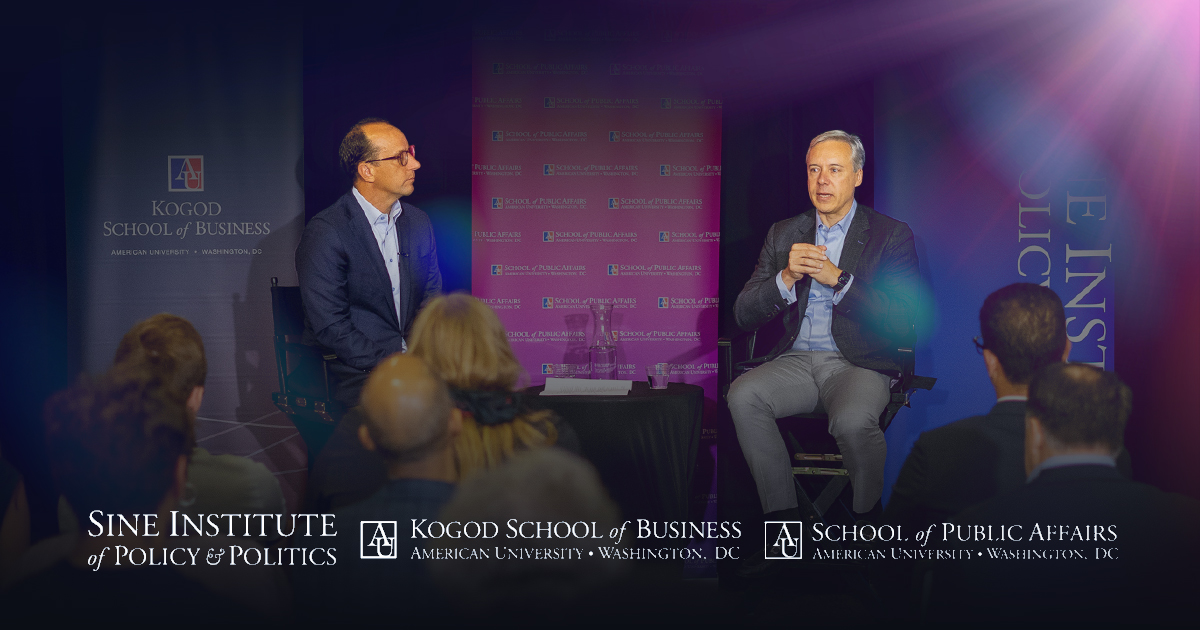
Kogod School of Business
Artificial intelligence (AI) can be an asset for national security—or a threat if left uncontrolled.
That was the message from Horacio Rozanski, the top executive at one of the nation’s premier technology and consulting companies, during an on-campus discussion with AU students, faculty, and alums as part of the Sine Institute of Policy & Politics’ Distinguished Lecturer series.
Rozanski is president and CEO of Booz Allen Hamilton—a global firm with an extensive government contracting portfolio, not to mention the employer for some 350 AU alums, including 50 from the Kogod School of Business.
Entitled “Harnessing the Power of AI for National Security,” the September 11, 2023, discussion occurred against a somber backdrop, 22 years after the most devasting national security breach in our nation’s history.
Preventing another event like the 2001 terrorist attacks, Rozanski told the audience, is at the heart of his firm’s work.
“We are one of the companies—I like to believe the best—bringing new ideas, transformation, and technology across all aspects of our government to hopefully prevent things like that from ever happening,” Rozanski said.
The conversation also took place amid some of the most rapid and significant technological changes we’ve ever seen, with the proliferation of artificial intelligence products promising to disrupt how we live and work.
Indeed, the growth of AI has only accelerated a decade-plus of change at Booz Allen Hamilton, where Rozanski has helped drive the execution of a strategy known as “VoLT,” focused on velocity, leadership, and technology.
It’s a transformation that prompted Kogod Dean David Marchick, the event’s moderator, to kick off the discussion with an existential question.
“Is Booz Allen a consulting company? Is it a technology company? National security?” Marchick asked.
I think we, by design, defy definition."

Horacio Rozanski
President and CEO, Booz Allen Hamilton
That Rozanski embraces change is befitting; as a college student, he emigrated to the US from Argentina—where, he said, life in a non-democratic nation helped clarify his values at a young age.
After completing his education at the University of Wisconsin-Eau Claire, Rozanski arrived at Booz Allen Hamilton in 1992 as a business consultant, rising to chief operating officer in 2011 and, ultimately, his current role as CEO in 2015.
Since 2012, Rozanski helped guide the company through an evolution strengthening its technological expertise to better serve its clients’ missions.
“We transitioned our business much more to the center of the mission: protecting troops, creating intelligence analysis, helping drive changes to public health, from as close to the mission as we could get,” Rozanski explained.
That evolution stemmed largely from the company’s anticipation that the wave of technological innovation seen in the private sector shortly after the turn of the century would soon spread to the public sector, requiring Booz Allen Hamilton to become an authority on transformative technologies.
“The government saw the ‘dot com,’ but it didn’t really affect them,” he explained. “By the early 2010s, it was really clear everything was about to change.”
Today, Rozanski said, about 60 percent of Booz Allen Hamilton’s workforce consists of “technologists,” from architects to coders, engineers, and physicists. The other 40 percent, he explained, are mission experts.
As part of this tech-centered transformation, Booz Allen Hamilton has increasingly turned to AI tools, announcing a strategic investment last year in Synthetaic AI.
The company made headlines earlier this year when it assisted the US government in tracking a spy balloon's trajectory–ultimately determined to have originated in China. Rozanski said the work would have been flatly impossible for humans to perform; it involved tracing a single balloon’s origin across an entire ocean over weeks of time. Assisted by AI, the work was completed in mere days.
AI can similarly assist the US in sifting through petabytes of drone and satellite feeds, perhaps protecting troops from IED attacks and other threats, Rozanski noted.
“AI promises so much when it comes to national security,” he said. However, the rapidly growing technology carries significant and well-documented risks, too.
“It’s as scary, in some ways, as nuclear technology,” Rozanski acknowledged before offering a sobering caveat.
To have a nuclear program, you have to be a large nation and devote a lot of time. This is very little money and very little time, by comparison.”

Horacio Rozanski
President and CEO, Booz Allen Hamilton
It’s a big reason the company announced an additional strategic investment in Credo AI earlier this year, to help it deepen its expertise in responsible use of the technology.
After all, it took 100 years for the telephone to “ruin dinner” with the explosion of telemarketing calls. The timeline for misuse of AI will be incomparably condensed, he said.
“We can no longer afford to launch a tech and hope for the best because somebody’s going to figure out how to weaponize that tech on day one,” Rozanski told the audience. “This is an all-hands-on-deck issue for our nation.”
Internally, Booz Allen Hamilton hopes AI technology may help craft first-draft proposals more efficiently, Rozanski said. The company further hopes AI will improve its candidate screening, potentially identifying cases where applicants might be better suited for a different job than the one they applied for.
Who should apply? Any candidate that shares Booz Allen Hamilton’s vision for purpose, mission, and using technology to solve problems on behalf of the country, Rozanski said.
